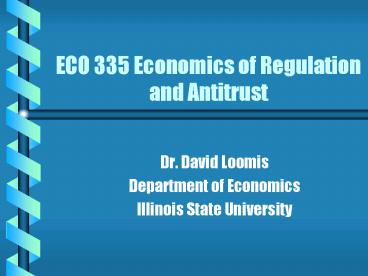ECO 335 Economics of Regulation and Antitrust - PowerPoint PPT Presentation
1 / 25
Title:
ECO 335 Economics of Regulation and Antitrust
Description:
Suppliers political representatives ... Can dissipate all monopoly profits. [For more information - review Posner and Peltzman articles] ... – PowerPoint PPT presentation
Number of Views:120
Avg rating:3.0/5.0
Title: ECO 335 Economics of Regulation and Antitrust
1
ECO 335 Economics of Regulation and Antitrust
- Dr. David Loomis
- Department of Economics
- Illinois State University
2
Introductions Who am I?
- Professional Background
- Teaching Philosophy
- Personal Life
3
Introductions- Who are You?
- Name
- Major
- When you had ECO 240
- Wall Street Journal
4
Introductions- Syllabus
- Readings
- E-reserves
5
Graduate Students
- Regulatory Sequence 335, 435, 436 and
internship - Internships arranged through Institute / 5-6
internships - IRPS What is it?
- Placement of Students
6
Acceptance into Sequence
- November Application
- Committee decision based on
- Grades
- GA work
- Language Skills
- Attitude
7
Undergraduate Students
- Who is taking ECO 300 jointly w/ this course?
- ECO 300 Syllabus
8
Lecture 1
- Government Vs. Markets
9
Types of Regulation
- Antitrust Policy - seeks to protect consumers
from anticompetitive behavior through the
judicial system - Direct Regulation or Economic Regulation -
controls pricing and/or output due to the belief
that the industry is inherently monopolistic
10
Types of Regulation
- Social Regulation - controls undesirable
consequences of firm behavior to obtain various
social goods such as clean air and water, safe
products and workplaces.
11
Perfect Competition- Assumptions
- Large number of buyers and sellers, each acting
independently - No buyer or seller is so large that it can affect
price - Homogeneous product
- No barriers to entry or exit
12
Perfect Competition - Assumptions
- No artificial restraint on prices
- Perfect information
- Profit maximizing firms
- Perfect mobility of factors of production
13
Perfect Competition - Short Run Behavior
- Market Demand is downward sloping
14
Perfect Competition - Short Run Behavior
- Each seller is a price taker - sells none if
prices above market-clearing price
15
Perfect Competition - Short Run Behavior
- Maximize Profit
- Marginal profit marginal revenue - marginal
cost - Marginal revenue marginal cost
16
Perfect Competition - Short Run Behavior
- Firm supply at MC above AVC sum of these curves
is market demand - curve
17
Perfect Competition - Long Run Behavior
- Firms enter Supply curve shifts to right until
all economic profits disappear
18
Perfect Competition - Social Welfare
- Efficiency in Production - incentive to produce
at lowest possible cost - Efficiency in Allocation - right amount of good
is produced since MC to produce equals marginal
willingness to pay equals price
19
Perfect Competition - Social Welfare
- Social surplus Consumer and Producer surplus
20
Monopoly
21
Monopoly
- higher price lower output than perfect
competition - misallocation of society resources
- X-inefficiency - firm doesnt work hard to cut
costs
22
Theories of Regulation
- Public Interest Theory - Regulation is supplied
in response to the demand of the public for the
correction of inefficient or inequitable market
practices. - Regulation would be highest in highly
concentrated industries - it is not.
23
Theories of Regulation
- Capture Theory - Regulation is supplied in
response to the demands of interest groups
struggling among themselves to maximize the
incomes of their members. Regulators are
captured by the industries that they serve - No linkage or mechanism by which a perception of
the public interest is translated into
legislative action. - Regulators dont always behave as captives
24
Theories of Regulation
- Stiglers regulation as an economic good
- Refined by Peltzman
- Regulation is a commodity or good
- Like any good, it has an equilibrium price and
output depending on supply and demand - Demanders - consumers wanting protection from
monopoly or producers wanting protection from
each other - Suppliers political representatives
- Conclusion special interests succeed in
political marketplace
25
Theories of Regulation
- Public Choice - Voting /Rent seeking
- Public Choice political actors maximize THEIR
well-being subject to the rules and constraints
they face in the political arena. - Voting must worry about getting a majority and
about the intensity of voters preferences - Rent-Seeking spending to acquire or maintain a
market position in which rents may be earned - Wasteful
- Non-productive
- Can dissipate all monopoly profits.
- For more information - review Posner and
Peltzman articles































